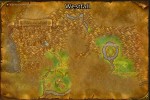I've been playing a lot of World of Warcraft the last couple of weeks. Ben has been talking about it, and I have heard so much about it, that I felt it needed to be tried. It's been years since the last time I seriously played video games, so I was behind on all this MMOG stuff and wanted to see what was up.
To write a simple review: Warcraft is fantastic. The way that the experience is constructed is very clever and there are great little touches everywhere. The problem the designers face are similar to many other kinds of experience designs (whether for theme parks, web sites or functional consumer products): they have to keep people's attention, make it fun regardless how long someone's been playing, guide people deeper without alienating or boring them, and constrain the behavior of many hundreds of players while giving the perception of complete freedom.
It's a difficult task and they pull it off very well. I may be writing more about it as I force myself to tear away from the game, but suffice it to say I've been dreaming in Warcraft for about a week, and although that's a little disturbing, it's a testament to the power of the experience (or maybe I just have too much time on my hands these days, but I don't think that's it).
The observation for today is on feedback. One of the ways that Warcraft differs from everyday life, and one of the primary ways that it stays so addictive, is through continual quantitative feedback. There are a lot of different progress indicators, and one or another is always going up. There are many, many ways to get "better" and, unlike the real world, these are quantified and observable. Rather than the abstract notion that I'm getting smarter by reading books, or getting a little more fit by walking, I know immediately when I get better and by how much. This is powerful positive feedback and although it's certainly possible to go too far with obsessing about quantifiable achievement, it's one of the things that drives the interest, and continual use, of the game.
Why would someone--namely, me--spend hours killing and skinning virtual animals just to get his shooting, skinning and cooking skills up?
This lead me to thinking about smart devices and social effects. One role that smart devices, or personal technology in general, can play in people's lives is to quantify the normally unquantifiable achievements. This quantification can help us conceptualize numerically--and we love to boil things down to numbers when obsessing, don't we? (see: engine displacement in hotrods, MHz in overclocked CPUs, heart rate, frequent flier miles, dollars in the bank, etc.)--things that we can't imagine otherwise. I think that there's an immense potential in devices that help us understand how much we do x or y. Then the whole world becomes a little like Warcraft and we can take our goals--"Level 14" becomes "a bit closer to my 43Things goal"--and maybe make them happen in the small steps that Warcrafts shows us and real life doesn't.
[The screenshots are, in order: places Irving--my dwarf hunter--has explored in the land of Westfall (the UI exposes more map as Irving travels), Irving's reputation with various races and cities, and Irving's skills (you can see he's not much of a cook, but he's even worse a miner ;-).]







Just found this blog post by John Maeda on how time goes faster when you have a progress bar:
http://weblogs.media.mit.edu/SIMPLICITY/archives/000109.html
I'm sure it's related.
I think you are absolutely right about "devices that help us understand how much we do x or y". Look at all the books about forming better habits or becoming more efficient. There is a demand to feel more in control of our lives, and of course, timely feedback helps that.
I can't think of many devices out there that even attempt this though. A pedometer is one, but I own a pedometer, and it is such a crappy device as to be almost worthless...